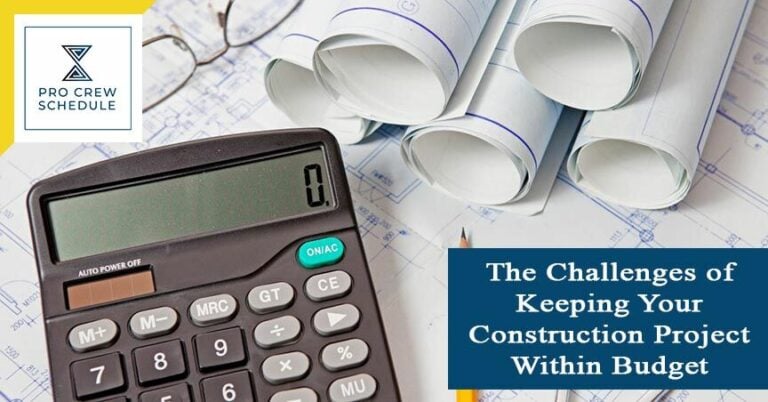Managing a construction project is one of the most challenging responsibilities of a project manager. In a conference paper presented at the Project Management Institute (PMI) Congress in 2012, entitled The top 10 challenges to effective cost controls (The top 10 challenges to effective cost controls (pmi.org)), there are several changing factors play a role in effectively managing construction budget, like how ready an organization is or how processes and systems are made. A construction project can be handled in many different ways, depending on things like the weather, the cost of materials, and the involvement of stakeholders.
In this article, let us look at the top challenges in managing your construction budget. But first, let us define what a construction budget is and how to plan one.
Defining What a Construction Budget Is
A construction budget helps you plan and carry out your projects while keeping your company’s profit-to-cost ratio safe. It shows all the costs of building your construction project, from the first inquiry to the final project handover. A comprehensive budget also determines how fast you can finish a project, how skilled the people you hire will be, and what kinds of tools and technologies you can use to ensure that it is completed on time and of the highest quality.
A general contractor usually makes the budget for a construction project with the help of professional estimators and bids from suppliers and subcontractors. Planning your budget ahead of time can ensure the most productivity and efficiency while keeping overhead costs low.
Costs to
Consider When Planning Out Your Construction Budget
There are many ways to plan the budget for a project, and most of the time, experience shows which works best. Putting costs into hard and soft costs is a common and effective way to plan a construction budget.
Soft or indirect costs are not directly related to building the project. It includes services that you may need before or after construction. It usually makes up about 30% of the total construction budget. The hard or direct costs comprise 70% of a construction project’s budget. It is directly related to the project’s physical construction and is easier to estimate and keep track of.
Putting your construction costs into these groups from the start will help you keep track of it better. With today’s digital advancements, you can check out many construction management software add-ons to help you manage costs better. As a project manager, you will better understand all your costs in either category, and it will be easier to find any costs you might have missed. In this section, let us look at the costs of construction projects.
Property Costs
Costs for property vary a lot depending on where it is and how big the project is; as a result, you need to set a realistic budget for your property investment. Land costs are an essential part of a construction project’s budget because they affect how profitable the finished product will be. With a new building project, the value of the land will always go up. By getting an accurate value at the start, you or the client can see how much the value has gone up because of the investment in the built asset.
Professional Fees and Consultation Services
A wide range of professional consulting and other services are needed for building projects – from architectural design services or specialized consultants such as master planning, soil surveyors, or accounting consultants.
Material Costs
Material costs make up a big part of your construction budget – with it, your project will most likely be completed on time. As a result, keeping a close eye on these costs is essential to get more out of your budget. An inventory management software can help you get a bird’s eye view of your stock levels and ensure that you have the right materials at a specific period. Most contractors have built strong relationships with suppliers to negotiate prices based on how much they buy and get the best materials.
Labor Costs
Predicting your labor costs is vital to making a realistic construction budget. Your construction crew is one of your most important resources to finish your project on schedule. There will be costs for tradespeople, subcontractors, equipment operators, and other professionals to show up on-site. Improving the productivity of your workers is a crucial way to keep your construction project profitable.
Equipment, Machinery, and Tools
Every construction project needs different kinds and sizes of tools and equipment. Depending on how they are used, equipment and tools can be hard or soft costs. The equipment needed to demolish, clear, grade, and fill lots or pave driveways and parking lots are used to build the project directly. Contractors should look at their lists of materials and workers to determine what kinds and how many tools and equipment they will need for the job.
Project Management Costs
Project managers must be skilled and well-organized to ensure that each construction project, regardless of size or scope, will have the best results possible. As a result, the people on the project management team also need tools and supplies to do their jobs. The salaries and office costs of the people on your project team will be included in the cost category for project management. Costs for project management also include security staff, safety supplies, and all other support roles and materials. Remember to list any construction technology tools, such as crew scheduling software, that you can use to speed up your project.
Bonds and Insurances
All construction projects, no matter how big or small, are required by law to have insurance coverage and pay the costs that go along with it. Professional liability insurance is a mandatory soft cost that must be figured into the budget. You may also have to pay a deposit or bid bond to show that your company will finish the project.
Bills and Utility Costs
Depending on the project, you may need to install gas, water, sewer, and electricity. These utilities have fees for permits and hookups that must be figured into the budget for the whole building project.
Project Contingencies
Leave much room in budgets so they can plan for the unexpected. Every construction project has unexpected costs, so it’s essential to include a contingency budget in a cost schedule. A contingency budget is money set aside to pay for costs that come up that were not planned for. It can keep costly production delays from happening because they give you the money to get back up and running no matter what happens.
Top Challenges When It Comes to Managing Construction Budgets
So, what is causing these delays and problems with the budget, and what can project managers do to get ready? In this section, let us look at the top challenges that project managers often encounter regarding construction budgets.
Inadequate Risk Management
Project managers often put in place measures to protect against long-term risks. The construction industry is made up of a million moving parts that offer many risks that can significantly affect your productivity and profitability. From unreliable subcontractors, scheduling problems, or stakeholders’ changing tastes, it is important to keep an eye out for this and to have backup plans.
Unclear Goals and Plans
Having clear goals that translate into clear plans makes it easier to get things done quickly. If people need a clear goal, it is easy for a building project to get behind schedule, go over budget, or both. These are necessary to ensure a project without these goals.
You can use construction scheduling software to keep everyone on track and ensure that each activity is progressing according to plan. Split up larger, project-wide goals into smaller, daily goals that each person can work on.
Poor Communication and Collaboration
Communication is important in every job, but it is especially important in construction, where different people are doing the same work. With clear and effective communication, important tasks can get lost, and the team might only know about a problem once it is too late to fix it. So, project managers need to come up with clear rules.
Cash Flow Lags
Invoicing is used in construction, but it is sometimes an old system. And if payments are made on time, it could help a company’s cash flow. This can make it hard to get money for other projects and slow them down.
So, systems for sending bills need to change. With better technology, such as construction project management software, you can efficiently keep track of your cash flows and ensure your company’s profitability.
Limited Skilled Workers
Construction is a business that depends a lot on its reputation. Most people work with people they already know and trust. This is a good thing because teams that know how to work together can be very productive. But when there are gaps in the team’s skills, it could slow things down. The solution is to discover these skill gaps before they hurt the project. Once you find these gaps, you can quickly and easily fill them – you can do training or skill development sessions for your crew.







